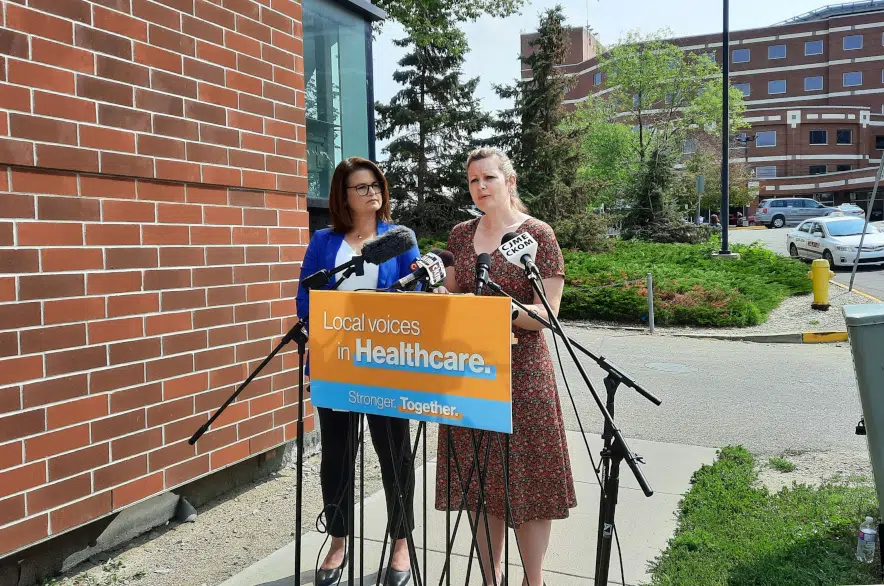A hospital intensive care unit is rarely not a busy place, but in Regina there’s one less bed — and therefore resources — to help take the load off.
According to an internal Saskatchewan Health Authority (SHA) memo released publicly Wednesday by the Saskatchewan NDP, one ICU bed was closed as of June 30 and won’t reopen until Sept. 5.
The memo explained that the ICU at the Regina General Hospital is seeing significant staffing challenges, and that over the last few months, contract workers — usually nurses, brought in on a temporary basis, often at a higher wage — have been heavily relied on in the ICU but there was “a number or contracts cancelled at the last minute” and new ones couldn’t be found until late summer.
“We know that (the government’s) current plan is not working when we see ICU beds closing at the Regina General Hospital,” Vicki Mowat, the NDP’s health critic, said while standing outside the General Hospital on Wednesday morning.
Mowat said intensive care is not something that’s optional for people.
“We’re talking about life-and-death issues. We’re talking about being able to get that life-and-death care,” she said. “When we cannot staff some of our most critical care in this province, that is a sign that this health-care system is broken.”
NDP Leader Carla Beck said it shows that the Saskatchewan Party government has been saying one thing publicly about health care, while the memo shows something different is going on behind the scenes.
“What have we heard from Scott Moe and this health minister? We hear that everything is just fine, that they’ve got a plan (and) that their plan is working. The fact is their plan is not working — far from it,” said Beck.
The leader said the government’s health-care recruitment strategy, launched last September, isn’t working and she believes the government isn’t interested in doing the work to create something that will do the job.
Read More:
Gov’t provides update on Health Human Resources Action Plan
Mowat pointed out that part of the plan to improve the health-care system was adding more ICU beds, but said this makes it clear the government doesn’t have a plan.
She also said the NDP has been pointing out for a while how unstable it is to rely on contract workers to such an extent.
Beck said the No. 1 piece missing from the government’s plan is a way to retain workers who are already in the system, and it needs to work with health-care employees to figure out a plan.
“The government shows no interest in getting to the table with (workers), no interest in taking them up on their solutions. (It) seems more interested in providing a tag line ‘the most ambitious plan ever,’ repeating it (and) repeating it while our wait times get longer and longer and we lose more health-care workers from the system,” said Beck.
Beck and Mowat are also suggesting things like expanding training in local communities to help people upgrade their skills and fill some of the higher-skilled positions, restructuring the fee model for doctors and moving toward team-based care, and enticing more part-time and casual staff to move to full-time.
The minister of health passed on 980 CJME’s request for comment to the Ministry of Health, which said in a statement that the average occupancy rate for that MICU is 78 per cent so it doesn’t anticipate the bed closure will impact patient care.
When it comes to contract services, the ministry said the SHA uses those workers when there are prolonged vacancies in any facilities in the province.
According to the ministry, since December, nearly 490 grad nurses have been hired and 250 new full-time permanent positions have been created across the province – almost 160 of which have been filled.
Late next month, the ministry said the province will implement its accelerated and streamlined pathway to help shorten licensure timeframes for internationally educated nurses. Nearly 400 nurses have been recruited from the Philippines and are at different stages in the process of getting to the province.







